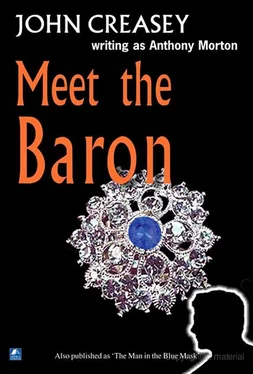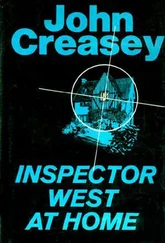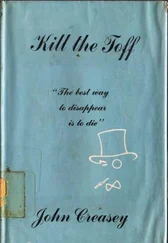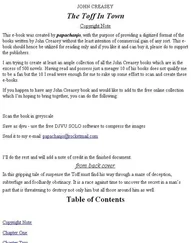John Creasey - Meet The Baron
Здесь есть возможность читать онлайн «John Creasey - Meet The Baron» весь текст электронной книги совершенно бесплатно (целиком полную версию без сокращений). В некоторых случаях можно слушать аудио, скачать через торрент в формате fb2 и присутствует краткое содержание. Жанр: Старинная литература, на русском языке. Описание произведения, (предисловие) а так же отзывы посетителей доступны на портале библиотеки ЛибКат.
- Название:Meet The Baron
- Автор:
- Жанр:
- Год:неизвестен
- ISBN:нет данных
- Рейтинг книги:5 / 5. Голосов: 1
-
Избранное:Добавить в избранное
- Отзывы:
-
Ваша оценка:
- 100
- 1
- 2
- 3
- 4
- 5
Meet The Baron: краткое содержание, описание и аннотация
Предлагаем к чтению аннотацию, описание, краткое содержание или предисловие (зависит от того, что написал сам автор книги «Meet The Baron»). Если вы не нашли необходимую информацию о книге — напишите в комментариях, мы постараемся отыскать её.
Meet The Baron — читать онлайн бесплатно полную книгу (весь текст) целиком
Ниже представлен текст книги, разбитый по страницам. Система сохранения места последней прочитанной страницы, позволяет с удобством читать онлайн бесплатно книгу «Meet The Baron», без необходимости каждый раз заново искать на чём Вы остановились. Поставьте закладку, и сможете в любой момент перейти на страницу, на которой закончили чтение.
Интервал:
Закладка:
“Distinctly,”
“It wasn’t the carpet or a table-leg,” said the Inspector very carefully. “Can you remember . . .”
“It might have been Gerry Long’s foot,” said Lady Kenton, “or Mr Mannering’s. I really don’t think that it’s important, Inspector, and if you don’t mind . . .”
The Inspector accepted his dismissal without a protest.
He knew that Lady Kenton had the ear of a number of prominent politicians, and he did not desire to be rebuked for zeal in that quarter. If events developed to give him a substantial charge against her ladyship it would be a different matter.
But as he went into the street he was very doubtful whether he would ever have such a charge to make. It didn’t seem feasible that the frail, bad-tempered old woman could have organised a robbery of that nature; it seemed less likely that she could have sent that letter to the Yard. He did wonder, however, whether she was thinking of shielding someone else. That would explain a great deal.
As he hurried towards Scotland Yard in a taxi he felt more worried than he had been all day. The effect of that challenge in the Morning Star was exasperating him. The disapproval of the A.G. was unpleasant.
“I’ll get him,” muttered the Inspector — of the Baron — suddenly. I’ll get him !”
“I’ve a good mmd,” said Lady Kenton viciously, as the door closed behind the spruce figure of the detective, “to complain to Nigel about him. Asking me questions like that . . .”
“He obviously didn’t like the job,” suggested Lorna.
Lady Kenton looked placated, and managed a wintry smile.
“I really don’t know how I should have got on without you, Lorna dear. I’m sure I should have lost my temper, or something silly like that, and the next thing I should have known would be to find myself in a police cell. I’m sure something dreadful like that will happen one day.”
Lorna chuckled.
“That man would do anything,” said Lady Kenton, roused immediately. “I’m convinced he came here to try and trap me into making some admission. I can’t bear the man. He was almost rude to me several times when I was inquiring about my brooch, and I have never seen it since.”
Lorna sighed to herself. She had hoped that the brooch topic would not crop up, for once Emma got on to that and the inefficiency of the police she was non-stop; and the younger woman felt that her patience was at a low ebb that morning.
Lady Kenton really wearied of the subject for once, however, and after one or two almost habitual remarks deserted it.
Over a cup of coffee she inquired about Lorna’s painting. It was a subject the younger woman had wanted to introduce, but policemen and pearls had side-tracked anything but a crude approach. The opportunity made her feel more cheerful.
“I’m not selling a great deal,” she said slowly.
“Selling?” Lady Kenton looked at her sharply. “You don’t have to sell, do you? You do it for pleasure. Selling . . .”
“Of course I sell,” said Lorna. “I’m an artist, my dear, not an amateur. It isn’t the money that counts, but my ability to earn it is the test. . .”
Lady Kenton interrupted her with characteristic contrariness as she poured out another cup of coffee.
“It does count, Lorna, and don’t make the mistake that it doesn’t. Money matters. Your father will always tell you that, I’m sure.”
Lorna laughed, and regarded her cup.
“I know,” she said. “I refused an offer for a picture six months ago, and I’ve never heard the last of it from Dad.”
“Why did you refuse it?” demanded Lady Kenton.
The offer wasn’t big enough,” said Lorna. “It’s worth four hundred at least, and I was offered only two-fifty,”
“When you reach my age,” said her ladyship thoughtfully, “you will realise it’s never wise to refuse money. Tell me about the picture, my dear,”
Lorna smiled, and described it at some length. She was very nearly sure that Lady Emma Kenton had fallen to the bait, and that before the day was out the picture would be her property, and that Lorna would hold the Kenton cheque for three hundred pounds. Lady Kenton could never resist a bargain.
And Lorna Faundey badly needed three hundred pounds.
CHAPTER SEVENTEEN
A CLOSE SHAVE
THE LETTER THAT MANNERING HAD SENT TO THE YARD HAD achieved its object, thanks to the carelessness of Wrightson and the wide-awake Morning Star man. It had cleared Gerry Long of suspicion in the robbery, but Mannering found that it was a question of robbing Peter to pay Paul.
Inspector Bristow was undoubtedly worried about his failure on the job. His anxiety cancelled Mannering’s anticipated pleasure in a conversation with the policeman soon after Bristow had left Regent’s Park and Lady Kenton. It was impossible to revel in another man’s discomfort, and Mannering began to wish that he had never been approached by Bristow. He liked the Inspector, and he disliked the idea of stabbing the man in the back.
Before he left the Yard, however, he was more cheerful.
Superintendent Lynch, who was fond of saying that he had eyes at the back of his head, came into the office, nodded cheerfully to Bristow, shook hands with Mannering, and introduced himself.
“Been talking with the A.C.,” he told the Inspector. “I’m coming on the Baron job with you, Bill. I’ve told him that I think it’s a bigger problem than he fancies, and he’s in a better temper than he was yesterday.”
Bristow’s face cleared. Lynch looked placidly at Mannering.
“We have a dog’s life sometimes,” he said. “It’s all right when we’re going smoothly, but when Old Bill makes a slip or I come a cropper we get a proper shaking-up. But it all blows over. What’s your theory about the Baron, Mr Mannering?”
For a fraction of a second Mannering was afraid that he had given something away, but Lynch was reaching across the desk to help himself to one of Bristow’s cigarettes, and the moment’s respite saved Mannering from making a faux pas.
“I haven’t one,” he said, coolly enough.
“That’s an advantage,” said Lynch, looking at him through a haze of smoke. “I’m glad you’re helping, anyhow.”
They chatted for five minutes, but nothing of importance was mentioned. Mannering left the Yard, smiling cheerfully to himself. He went to Park Square, chatted for ten minutes with Gerry Long, who had recovered as well as had been expected, and who was sitting up in bed. Gerry was sorry for himself, and mad with himself. Mannering told him to forget it.
“It’s so darned silly,” said Long, “that I can’t think of any way of thanking you, Mannering,”
“The chance may crop up,” smiled the other.
He went to his flat, took the Overndon pearls from their hiding-place soon afterwards, and went to Aldgate. On the way — he travelled by taxi — he altered his appearance sufficiently to make reasonably sure that no casual acquaintance would recognise him. At a small barber’s shop in a turning off the High Street he waited for a bald-headed, jolly-faced man to waddle into the back-parlour which he had entered.
“Morning, Mr Mayle,” The bald-headed man wheezed the greeting cheerfully. He was tremendously fat, a fact emphasised by a pair of slacks let out at the waist with a material different in colour and quality, an Oxford shirt without buttons, opening to reveal an expanse of soft, dimply flesh, and a pair of carpet-slippers.
“Same as usual for you, sir?”
Mannering nodded, and smiled.
The fat man grinned, revealing teeth that were surprisingly white and strong. Mannering waited for him patiently, knowing that Harry Pearce could not be hurried. The barber did many things besides cutting hair and shaving week-old stubble. Mannering had been introduced to him by Flick Leverson, that philosophical fence who was now in gaol. Harry supplied all kinds of make-up, and even helped to apply it. He asked no questions, relied on the generosity of his customers for payment, and was not averse to doing a job for nothing. In that strange world of small thieves and petty rogues a man might be penniless one day and rich the next; Harry knew that his credit would rarely be stretched to breaking-point.
Читать дальшеИнтервал:
Закладка:
Похожие книги на «Meet The Baron»
Представляем Вашему вниманию похожие книги на «Meet The Baron» списком для выбора. Мы отобрали схожую по названию и смыслу литературу в надежде предоставить читателям больше вариантов отыскать новые, интересные, ещё непрочитанные произведения.
Обсуждение, отзывы о книге «Meet The Baron» и просто собственные мнения читателей. Оставьте ваши комментарии, напишите, что Вы думаете о произведении, его смысле или главных героях. Укажите что конкретно понравилось, а что нет, и почему Вы так считаете.












